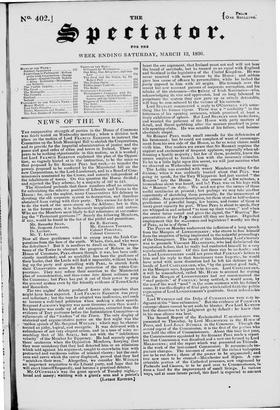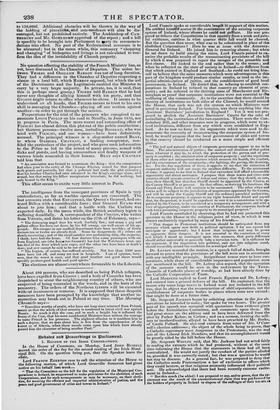NEWS OF THE WEEK.
THE comparative strength of parties in the House of Commons
as fairly tested on Wednesday morning ; when a division took place on the motion of Lord FRANCIS EGERTON to instruct the Committee on the Irish Municipal Bill to abolish the Corporations, and to provide for the impartial administration of justice and the peace and good order of cities and towns in Ireland. There ap- pears to be nothing objectionable in this motion, as it is worded ; but Lord FRANCIS EGERTON explained the plan of the Opposi- tion, so vaguely hinted at in the instruction, to be the same as that proposed by Sir ROBERT PEEL last week,—to transfer the powers proposed to be conferred by the Ministerial bill on the new Corporations, to the Lord-Lieutenant, and to a Board of Com- missioners nominated by the Crown, and entirely independent of the inhabitants of towns. On this question the House divided ; and rejected the Tory scheme, by a majority of 307 to 243.
Mr. Recorder SHAW, Mr. Sergeant JACKSON, Dr. LEFROY, Mr. T. LEFROY, Now all these gentlemen voted to sweep away the Irish Cor- porations from the face of the earth. Where, then, and who were the defaulters ? But it is needless to dwell on this. The impo- tence of the Tories to obstruct the progress of Reform in the Rouse of Commons, PEEL-chosen though it was, has been suffi-
ciently manifested; and so unskilful has been the guidance of their leader, that the Lords will find it impossible, without break- ing up the party and quarrelling with PEEL, to stretch forth their Conservative arms for the protection of the rotten Cor- porations. They may refuse their sanction to the Ministerial plan of reconstruction, and thus come into direct collision with the Commons; but PEEL has put it out of their power to prop the present system even by the friendly evidence of Town-Clerks and Recorders. The Standard pretends that these numbers afford no criterion for calculating the relative position of Liberals and Tories in the Rouse ; for, says the sophist, many Conservatives felt delicacy in devoting the old corporate system to destruction, and therefore abstained from voting with their party. This excuse for defeat is to do the work of the snow-storm on the Address; but in this, as in the former case, it is ludicrously inapplicable and untrue. Who are the Members most likely to feel reluctance at surrender- ing the "Protestant garrisons ?" Surely the following Members, if any, would be found in the list of the pitiful and punctilious. Sir R. BATESON,
Mr. EMERSON TF.NNENT, Colonel PERCEVAL, Colonel CONOLLY.
The two nights' debate produced fewer able speeches than might have been expected. Lord FRANCIS EGERTON was prosy and indistinct ; but the tone he adopted was inoffensive, and such as became a well-bred politician when making a show speech. Sergeant JACKSON'S bigotry was more tiresome even than usual : his harangue was made up of old calumnies, extracted front the evidence of Tory partisans before the Intimidation Committee—a rtfaeimento of the " leaders " of the Times. The only display of oratorical and argumentative power on the first night was the :-aaiden speech of Mr. Sergeant WOULFE; which may be charac- terized as pithy, logical, and energetic. It was delivered with a redundance of not very elegant action, and in a tone of voice re- sembling that of Mr. SHEIL, but not with the " infelicitous velocity" of' the Member for Tipperary. He had scarcely spoken three sentences when the Opposition Members, fancying (but they were mistaken) that they had detected him in an admission which told against his argument, sought to overwhelm him with protracted and vociferous vollies of ironical cheers : but the cool- ness and nerve which the orator displayed, proved that they had " mistaken their man." Altogether, we consider Mr. WOULFE an important acquisition to the Liberal party, and hope that he will exert himself frequently, and become a practised debater. Mr. CICONNELL's was the great speech of Tuesday night,— broad and massy; wielding with a giant's arm and a patriot's ELATICST. EPITION4 heart the one argument, that Ireland must not and will not bear the brand of servitude, but be treated as an equal with England and Scotland in the legislation of the United Kingdom. He was never received with more favour by the House ; and seldom gave less cause of offence by personalities, while lie lashed the party opposed to him with all might. His triumph over the recent but now recreant patrons of corporate corruption, and his rebuke of the statesmen—the galaxy of Irish Secretaries—who, acknowledging its vice and oppression, had so long laboured to perpetuate the system they now gave up as utterly detestable, will long be remembered by the victims of his sarcasm.
Lord STANLEY commenced a reply to O'CONNELL with some- thing like his former vigour. There was a " cordiality " in the bitterness of his opening sentences, which promised at least a lively exhibition of spleen. But Lord STANLEY soon broke down, and wearied the patience of the House with petty matters of detail, and fluent quibbling after the manner practised in juve- nile spouting-clubs. He was sensible of his failure, and became absolutely stupid. Sir ROBERT PEEL made small amends for the deficiencies of his lieutenant ; but he could not complain of want of encourage- ['lent from his own side of the House, as far as noisy cheers could vivify him. Our readers are aware that Sir ROBERT requires the support and excitement of frequent applause, especially when ad- dressing a hostile majority ; but few of them, probably, know the means employed to furnish him with the necessary stimulus. To let in a little light upon this secret, we will just mention what we observed on Wednesday morning. The Lobby was crowded with weary Members waiting for the division; when it was suddenly buzzed about that PEEL was going to speak, for the Tory Whipper-in had just carried " the Roarers " into the House. In the course of a few minutes, a tremendous shout was heard, and 10! PEEL was on his legs with his " Roarers " on duty. We need not give the names of these useful auxiliaries at present ; but perhaps we may take another opportunity of sketching them personally, for the amusement of the public. Asa generic description, let them stand as half-a-dozen gentlemen of powerful lungs, few brains, and (some of them at least) great capacity for port. When PEEL is about to speak, they are whipped-in and ordered "to tune up their voices;" and when the orator turns round and gives the signal, the " Roaring" Re- presentatives of the Fkl',3 shout till they are hoarse. Dignified employment this for statesmen and legislators worthy are they of PEEL, as he is of them I The Peers on Monday underwent the infliction of a long speech from the Marquis of LONDONDERRY; who strove to free himself from the suspicion of being implicated in the unlawful proceedings of the Orangemen. The result of this blundering Lord's oratory was to persuade Viscount MELBOURNE, who had disbelieved the imputation before, that lie really had conducted himself in a very reprehensible manner. Of this fact there can be no doubt ; and as Lord LONDONDERRY could not prove that FAIRMA Ws letters to him and his reply to that functionary were forgeries, lie would have acted with more discretion had he left his defence in the hands of Lord CASTLEREAGH, who, "by the greatest good luck," as the Marquis says, happens to be his son. Lord CASTLEREAGH, it will be remembered, called Mr. HUME to account for stating that the Marquis of LONDONDERRY had not countenanced the "mad projects" of FAIRNIAN; being nettled, it would seem, by the use of the word "mad" in the same sentence with his father's name. It was this display of filial piety which called fin th the public expression of Lord LONDONDERRY'S gratitude. Great indeed is his " luck."
Lord WYNFORD and the Duke of CUMBERLAND were very in- dignant at the " base calumnies." But the evidence of FAIRMAN'S correspondence cannot be set aside by bluster. Poor Lord KENYON had the discretion to let judgment go by default : he knew that in his case silence was best.
The Second Report of the Ecclesiastical Commissioners was presented on Thursday, by Lord MELBOURNE in the House of Peers, and Lord JOHN RUSSELL in the Commons. Though the second report of the Commission, it is the first of the parties who now hold the. office of Commissioners. About this time lust year, the Commissioners appointed by Sir ROBERT PEEL made a report but that Commission was dissolved and a new one formed by Lard MELBOURNE; and the report which was presented on Thursda is the work of the last-named Commission. It recommends im- portant changes. The incomes of some of the richest bishoprics are to be cut down; those of the poorer to be augmented; and two new ones to be created—Manchester and Ripon. A con- siderable portion of the Cathedral revenues, now engrossed by Prebends and Canons, is to be paid over to Commissioners, to form a fund for the improvement of small livings. In various ways, and at some future period, this fund it 9ispeeted to amount to 130,0001. Additional obstacles will be thrown in the way of the holding of pluralitiba, and non-residence will also be couraged, but not prohibited entirely. The Archbishop of CAN- TERBURY and Mr. Gonnuast approved of the report ; and a bill is speedily to be brought into Parliament to limy its recommen- dations into effect. No part of the Ecclesiastical revenues is to be alienated; but in the mean while, this summary " chopping and changing " of bishoprics and livings is not calculated to con- firm the idea of the inviolability of Church property.



























 Previous page
Previous page